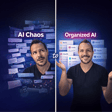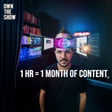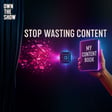Become a Creator today!Start creating today - Share your story with the world!
Start for free
00:00:00
00:00:01

The State of Enterprise AI & What It Means for Everybody Else
In this AI marketing podcast episode, Dan Sanchez shares insights from his recent experience at the Breakthrough conference hosted by 6sense. He explores how AI is evolving beyond surface-level features and becoming deeply integrated into SaaS products. Dan reveals what enterprise and mid-market companies are doing with AI, the friction points slowing them down, and how smaller teams can turn that into a competitive advantage. He also introduces 6sense's new Revy AI and reflects on the future of account-based marketing.
My Favorite AI Tools:
- Tella - https://danchez.com/tella
- High Level - https://danchez.com/highlevel
- Zencastr - https://danchez.com/podtools
- n8n - https://danchez.com/n8n
Resources Mentioned:
- 6sense - https://6sense.com
- Revy AI - https://6sense.com
- Suno - https://suno.com
- Buyer Research Report - https://danchez.com/buyerreport
- Mike Kaput’s LinkedIn Post - https://www.linkedin.com/posts/mikekaput_federal-reserve-chair-jerome-powell-just-activity-7391475562416046081-BwuY/?utm_source=share&utm_medium=member_desktop&rcm=ACoAAAJq6gwB_q7tbdFevQk2MATQbXLntrfkInA
Timestamps:
- 00:00 – The Maturing Landscape of AI in SaaS
- 01:30 – Takeaways from the Breakthrough Conference
- 03:00 – Enterprise Advantage: AI for Intent Data & Signals
- 06:00 – Enterprise Bottlenecks: Compliance & IT Limitations
- 08:00 – Why Small Teams Have the Edge
- 11:30 – Revy AI: AI Becomes the UI
- 15:00 – The Future of ABM with AI
- 19:30 – Everyday AI: Custom November Music & Hotel Research
- 21:00 – Sixth Sense Research Report Breakdown
- 23:30 – The Critical Buying Stage & Marketing Implications
- 26:00 – AI’s Impact on the Job Market
Would you like me to move on to the next step and write the newsletter version now?
Transcript
Intro
Rapid Maturation of AI
00:00:04
Speaker
As more and more and people adopt AI, we're finding that AI is really beginning to mature, not just in the frontier models like ChatGPT and Gemini, but in all the different SaaS apps that are incorporating AI into their products.
00:00:17
Speaker
We're getting past the stages where it's just a little simple light modification to the products where you can summarize and make some text more friendly, right? Like those have been around for a while now, and we're starting to actually see some really incredible implementations of AI into SaaS
Sixth Sense Conference Insights
00:00:31
Speaker
products.
00:00:32
Speaker
Now, I just got back from breakthrough, this conference from Sixth Sense, and got a pretty good taste of what's going on in enterprise-level companies, or let's say mid-market and up.
00:00:43
Speaker
And I can tell you there is a lot of changes happening across companies like Sixth Sense and across the users that are playing at a higher level that I think are major, major advantages for those companies.
00:00:54
Speaker
But there's also some disadvantages. There are some things that are slowing them down that become the advantage for everybody else. And that's what I want to get into in this episode.
Strategic Advantage with Sixth Sense Data
00:01:08
Speaker
Welcome back to the AI-driven marketer. I'm Dan Sanchez. My friends call me Danchez. I was in breakthrough for two days and I wanted to bring back what I've learned from talking to multiple dozens of enterprise level marketers and marketers who work at mid-size companies.
00:01:24
Speaker
Now, Sixth Sense is a platform that was most Mostly a data company with, of course, a software layer to help people make the most of the data. they They capture a lot of different data going on out there on the internet and collect it and format it and put it all together to essentially give companies that have a subscription to Sixth Sense signals.
00:01:45
Speaker
Essentially, it can tell people, it can tell companies whether a company is likely to be in the market when they buy. And I'll explain a little bit more of the buyer cycle when I cover their recent part.
00:01:56
Speaker
But it's at a strategic advantage for people who can afford or people who invest in companies like Sixth Sense.
AI in Enterprise Marketing
00:02:03
Speaker
And when I talk to people who are using AI at the enterprise level or the mid-market level over and over again,
00:02:09
Speaker
I discovered the thing that they were getting the most value from it as research and intent and signals. Things that they could act on. With tools like Sixth Sense, they actually have a competitive advantage in being able to look across the whole market and know which one of their accounts, which one of the companies they'd love to do business with.
00:02:28
Speaker
If they are interested or beginning the process of looking for the thing that they sell. That's huge because we know there's only a maybe a third, maybe 20% of the market that's kind of in the beginning stages of trying to figure out a solution to a problem. They're starting just beginning to recognize. And if you can market to them, if you can put more ad spend on that, if you can take your your SDR, your sales team and reach out to them a little bit more aggressively during that time, you could be more strategic with your resources.
00:02:58
Speaker
And that's huge for companies that invest in something like Sixth Sense. But there's also some disadvantages that I found in talking to a lot of the the people implementing AI solutions in these larger marketing
Challenges in Large Company AI Adoption
00:03:11
Speaker
teams. You see, if you haven't worked in a large company, you don't know some of the pains they have to go through.
00:03:18
Speaker
They have to be really good at fighting to push initiatives forward because they have two other teams, three other teams, I'd say, that they have to make sure to have sign-off on, not just the marketing leaders, not just the executives, but your legal team, your compliance team, and your security teams, especially your IT security teams because ai well, it's a new thing, and there are certainly security vulnerabilities with it. So because of that, a lot of these larger teams are essentially using AI that has a huge security compliance layer attached to it that is a little bit hampered, let's say.
00:03:54
Speaker
It's kind of like using AI from like a year and a half ago, which was good for its time, but it's not nearly as good as what we have today, right?
Agility of Smaller Businesses with AI
00:04:02
Speaker
And that becomes the advantage for everybody else.
00:04:06
Speaker
If you're mid, like mid small small business or solopreneur even. you have a massive advantage. You might not have the ability to have something like Sixth Sense, which can see the market and actually level it that way, but you have some major advantages for yourself. And I think that kind of becomes the thing. And we've known this. We've known that small players are often small ships that can go faster, right? And the big players are big aircraft carriers, which are harder to harder to turn. It takes them along much longer you to get a good campaign implemented.
00:04:37
Speaker
But that becomes the advantage for the smaller players out there. is You can be using the Frontier models like ChatGPT and Gemini and Claude and even Grok to get things done faster.
00:04:48
Speaker
You can implement automated sequences more quickly. You can actually experiment more aggressively. There's still risk involved, as there is with all new things. But because you're not a massive company, because you don't have a lot at stake yet, the risk is a lot smaller.
00:05:04
Speaker
Because as soon as you're big and successful and have some cash, it's kind of painting a target on you, which is why they have to be so much more careful. It just comes with the territory.
00:05:15
Speaker
There's advantages on both sides. If you're mid to enterprise, You have some significant advantages in your ability to have data to play with.
00:05:26
Speaker
Either data you kind of rent from companies like Sixth Sense or even your own internal data to run and run AI reports on. And I think that's huge. Imagine if you could go to something like Sixth Sense and be like, what are a couple accounts that are moving in market that aren't even on our sales team's radar right now?
00:05:43
Speaker
Before, you wouldn't have any idea. if There's no AI tool to help you figure that out. But with Sixth Sense's data, with AI connected, you can now actually go and find that kind of information.
00:05:54
Speaker
So that's kind of a big lay of the land I saw as I was having lots of conversations with different marketers this week at that conference, is that there's some really cool things happening at big companies when it comes to AI. Disadvantages still that make room for everybody else.
00:06:09
Speaker
So if you're a big company, take advantage of what you have. If you're a small, smaller company, take advantage of what you have. Both have ways to win when it comes to using AI to get ahead.
Revy AI's Role in SaaS
00:06:19
Speaker
Another big thing I saw at the breakthrough conference was such a big deal that they added to Sixth Sense that I think is is is a forerunner. It's like a precursor to what we're going to see across every different SaaS app out there.
00:06:30
Speaker
They released it as something called Revy AI. This Revy AI feature is just like another chat bot built into the SaaS product. Almost like like you log in see the little intercom customer support kind of thing.
00:06:43
Speaker
But it's what it can do that I think is is going to pave the way for a lot of other companies to do the same thing. I'm excited that Sixth Sense is putting in because they have the data for it to work. It has the ability not just to talk to you about whatever the AI can talk to you about and just hook it up to docs for it to search, but it has access to all the different things going on within the SaaS app itself.
00:07:03
Speaker
All the data. All the workflows, all the campaigns, all the different sequences you have set up. Imagine being able to go to that and ask it for reports. And every time your CEO is like, hey, well, what about this and this? how What was the impact of this? what What are we doing about kind competition about this?
00:07:20
Speaker
Well now, you can actually just go to your tool and ask. Whether you're using something like Sixth Sense, which has that that signal data, or you're using something like Salesforce or HubSpot. Imagine being able to go to tool that can go and just query all the things that you have going on in that tool. All of a sudden, you're not having to spend two weeks trying to create a dashboard that kind of answers the question. A lot of us have too many dashboards already.
00:07:42
Speaker
Having this kind of layer is just extremely helpful. But that's not all Revy was going to be able to do. Revy can actually take actions and build things. I'm sure when they release this in January, people will be pretty hesitant to have it go off and build whole campaigns or segment audiences. These, especially at the level where Sixth Sense users are playing at, are pretty particular about how they like to do things.
00:08:03
Speaker
but it's a step forward in that direction. And as I saw it, I realized, and they even said this from the stage, that this isn't just AI. This is AI as UI. This isn't just a feature. This is a whole different way of interacting with a very sophisticated application. And that's going to change the game. It's going to change the game on a number of different fronts. It's going to make it easier to get started with
AI Transforming User Interfaces
00:08:26
Speaker
applications like this. And it's going to make it possible for you to interact it in a couple of different ways.
00:08:31
Speaker
If it's just a conversation, It can even be voice enabled. Imagine being on the go and being able to dictate to the app, be like, hey, can you pull a report for me and then send it to me so I could read it at 1 p.m. before my next meeting?
00:08:42
Speaker
And then it just sends you the email with everything you want to know. It's almost like having an assistant connect to every single major application you use. Eventually, these different these different AI assistants or or agents or whatever the heck we want to call them, AI is UI, AI is operating system, right? There's all these different names floating around.
00:09:00
Speaker
They'll be able to talk to each other. That means your sixth sense will be able to talk to your sales force, which will able to talk to your HubSpot and so on and so forth. And they'll be able to coordinate to get work done. That's exciting because that means we can be way more efficient, way more productive and actually get it a little bit of lengthen or shorten the time to go from idea to actually executing the thing.
00:09:22
Speaker
Now, the big concern when you hear things like this is like, oh my gosh, like, what am I going to do? A lot of a lot of marketing operations people are like, what that's my job right there is just pushing buttons.
00:09:33
Speaker
I know it's sad when you think about that. It's like implementing it is all the button pushing. But I often think that marketing operations specifically can take a much more strategic role in the organization and has to be the one helping pioneer these things because they're the ones that know what is actually possible and i can engineer it.
00:09:49
Speaker
And if there's one thing I know about marketing, a boss told me one time is that marketing tends to be a black hole. You can always feed it more, more, more time, more talent, more budget. There's always more marketing can do.
00:10:02
Speaker
And I'm kind of counting on that personally, that there's always going to be more room for marketers and more room for marketing to get ahead and more content to make more releases, more the relationship building, more everything, more ads, everything.
00:10:16
Speaker
There's always going to be more and there's always going to be a need for a human. Now, of course, I'm doing a whole series with Cam Frey on the value that humans bring to the equation. So I won't cover that here. It is exciting to see the next almost evolution of AI coming into this software and SaaS as a big forefront in the UI of the app, the user interface, the way we'll be interacting with these tools. so So that was a big aha for me at the conference.
Account-Based Marketing in B2B
00:10:43
Speaker
And the last piece of news that I got from this conference is around the topic of account based marketing or ABM. This is a very B2B topic. If you're a B2C marketer or you're yeah like you've never heard the term ABM, that's okay. Let me explain it to you and know that it's it's a really helpful concept.
00:11:00
Speaker
It's something that I think even B2C marketers, especially B2C marketers who sell high ticket items, luxury items, would do well to kind of understand better because I think this could play a big role. And oftentimes if you do really well in B2C, you end up graduating into B2B.
00:11:17
Speaker
So this is a really helpful concept to understand. So let me give you a quick explanation of what account based marketing is and why it's so cool in a B2B sense. Account based marketing is essentially just targeting accounts.
00:11:28
Speaker
In B2C, you don't know who your prospective buyers are. So you have to try to segment based on your demographics, maybe even your psychographics, the things that we know about them, the the common traits of the people most likely to buy our stuff.
00:11:41
Speaker
But in B2B, we have a whole third dimension that becomes even more important than demographics and psychographics. We call them firmographics. the characteristics of different companies that were more likely to buy from us. But we can get even more specific because there's like a public record of every single company.
00:11:58
Speaker
So we can actually isolate out, even if, especially if we're going after big companies, publicly traded companies, they have lots of data out there. We can even find the people that are most likely to buy from us within an organization.
00:12:09
Speaker
We can even go and find all the contact information for all the people across all the accounts we want. Whether it's their phone number, email, office address, personal address, you can go and buy all that information.
00:12:21
Speaker
So what does marketing look like when you already have a perfect picture of your customers? That's where ABM comes in, account-based marketing. Because you can market to specific accounts, big accounts, accounts that with one deal can earn you $100,000, $1 million, $10 million. dollars Yeah.
00:12:39
Speaker
So if one account is worth that much, you can spend a lot of time marketing just to just a handful of individuals within an or one organization. And it would be worth it. It would make a huge difference.
00:12:51
Speaker
And so in account-based marketing, we often talk about this thing, one to many, one to few, and one to one. And I'm borrowing this graphic from Raul Kishan over at LinkedIn. Thank you, Raul, for making this graphic. Go find, if you want to learn more about this topic, go find him over on LinkedIn.
00:13:06
Speaker
I just found it on Google search. And I was like, hey, let's give let's give Raul shout out here for making this graphic because I'm using it for this podcast now. because if we know who the prospective buyers are then we can target them more strategically the ones that are worth the most that are probably the best fits for us we can do one-to-one we can reach out to the very specific individuals and try to build relationships with them meet them greet them invite them to private events all that kind of stuff but you can do those on a one-to-one now some accounts might be a little smaller or maybe are less strategic for us so we
00:13:38
Speaker
we We do hyper personalization, we send out handwritten cards, we do gifts, we do a lot of different things, but we only do that for a few accounts and then there's one to many. In a lot of places you can still programmatically like target with ads different accounts and pursue them with direct mail and a bunch of different mass options, but still it's customized for the account. You can customize a lot of things now for every single business that you're reaching out to and that's very exciting.
00:14:02
Speaker
Now, the reason why this is important, because what I found in my conversations with marketers who are doing a lot of account-based marketing, often through software called Sixth Sense, is that this is changing.
00:14:14
Speaker
There used to but only be so many things you could do one-to-one, one-to-few, without like really like stressing out your whole marketing and sales team, right? And you couldn't do one-to-few where you would work in with the broad accounts. With accounts you can only afford to do one-to-one with, you can now do...
00:14:28
Speaker
one to few like instead of having a top 10 list that you can only do strategic one-to-one with well you can open maybe open that up to top 50 accounts you're doing these one-to-one interactions with and maybe the the hundred accounts that you used to only do one to few with well you could probably open that up to 500 accounts the accounts that were only in one to many now you can now move to one-to-few. And the ones you're doing one-to-few, you can move to one-to-one because AI makes it easier to do hyper-personalized, hyper-custom pages or campaigns.
00:14:59
Speaker
Imagine making a single landing page for just one person at one company. That's that's a one-to-one level thing. But now you could do it en masse and have it hyper-personalized because AI can learn a few things about all those individuals and create a landing page from scratch like that, how AI is impacting something like account-based marketing.
Importance of Timing in Marketing
00:15:17
Speaker
But of course, you have to have good data do so, which is why Sixth Sense such becomes such a compelling option. So that's it on the news of what I brought back from the Breakthrough Conference. Let's move over to the next segment of Everyday AI.
00:15:30
Speaker
I'm not here with my bro to share a bunch of things, but at at least I have two things to share with you today. The first one is, this is kind of a fun one, I've been using AI to come up with music for November.
00:15:40
Speaker
because i don't know about you, I freaking love Christmas. I've been listening to Christmas music, but I do it secretly because my wife is like, slow down on the Christmas thing there, cowboy. I know you like Christmas, but can we just have November? So I'm like, no Christmas music? Fine.
00:15:53
Speaker
So I've been making November music, like and I'm trying to come up with like what the vibe for November is. i find it to be a very nostalgic, reflective month for me, so I've been coming up with some very, like...
00:16:05
Speaker
fun, lighthearted, but sometimes contemplative type music. And I've been using a combination of ChatGPT to not only come up with the lyrics for it, but also to come up with the style and the genre of the music. And I'm going back and forth making multiple songs. Then I send it over to Suno and literally just give whatever ChatGPT is giving me I give him the lyrics and give it the style.
00:16:25
Speaker
ChatGPT is really good at writing style for music, I found. And then Suno has gotten so much better that it's often hidden in the mood that I want. within one, two, or three tries. he used to take dozens of tries to get one good track, and now it only takes a couple.
00:16:37
Speaker
It's amazing how great these software tools have become and how far they've come in just one year. I only started using this stuff about a year ago. So I've been making a whole soundtrack for the month of November. If you'd like to take a listen to it, go to the link in the show notes, and you can listen to my little custom album on the month of November. You'll have to listen to it on soon. I was not going to pay to get this one into Apple or Spotify or whatever.
00:17:00
Speaker
Another way I've been using AI this week is around to just doing a doing research on the backstory behind the hotel I was staying at, which the conference was hosted in. It was this really crazy hotel, massive at the end of the Las Vegas Strip, called the Fontaine Blue, or Fontaine Blue? i don't know. The name's hard to pronounce. so Fontainebleau. And there was quite the backstory, but it was a really cool hotel. So naturally I'm like, Chad Chibuti, tell me about the backstory of this hotel. Who built this thing? Like, why is it the way it is?
00:17:29
Speaker
And all the find out that that hotel had only been open two years ago. Yet it broke ground in 2005. Yeah, so it almost got completed and then fell through and then got went through multiple hands before coming back to the original owner and then completed. Crazy story on that hotel, but it was interesting just to go straight to ChatGPT and ChatGPT to give me the whole rundown and backstory of the hotel and how they designed it and what they were thinking and what I would appreciate because it knew a few things about me and what I like and details to pay attention to.
00:18:00
Speaker
It's almost like ChatGPT has become a bit of a tour guide, and it's really good at giving you the broad strokes of things that you would have never known before, things that you can now appreciate about the places you're going and visiting.
00:18:12
Speaker
So it's a really fun way to use AI. Now, instead of a poll this week, I wanted to dive a little bit deeper into a big research report that Sixth Sense released, and I did a whole interview Kitsch.
00:18:23
Speaker
Kerry Cunningham, who was the head of this research report, but I wanted to give a visual and actually dive a little bit deeper into one section of that report that I find is just really helpful. If you want to do a deep dive, go and find the episode I published yesterday with the interview with Kerry, who was the head of research for this report, but I actually wanted to talk about it a little bit more as I just found it to be so insightful, especially if you're in a B2B sense, and it was around this topic, and I'm going to the graphics, so literally a shot I took from my phone as I was sitting in the crowd. I had to zoom way in to get this.
00:18:52
Speaker
I'm because I was sitting in the back, but it's around this B2B buying cycle. And this was just really important research to me. And something that I think is, i don't know, is is something I'm still kind of chewing on and wrestling with as a marketer.
00:19:05
Speaker
And this is what it looks like. Like, it's this is based on a ton of data. i Remember, Sixth Sense is kind of a data company. So they went through and looked through all the data to mark this. They're saying, based on all their data, and again, they have fantastic data,
00:19:17
Speaker
About all your target accounts, 60% of them aren't in market like at all for whatever that at any one time on average across industries so for mate for major solutions. 17% of the accounts are in the awareness stage. So they're just becoming aware of the problem, starting to wake up to the fact that they might need help 17% are in the consideration stage. 4% are in the decision stage where they actually have a row of or a list of vendors or solutions they're considering and now evaluating and working through with all the stakeholders.
00:19:53
Speaker
And then 2% are in the purchase stage where theyre they're working through the final details and towards purchase. with the selected company. And now they're working through the procurement process, right?
00:20:03
Speaker
So this is a really good snapshot that is accurate because again, they have so much research and I'll link to the exact research report. If you want to go into the details of it, I made a short link. You can go to danchez.com slash buyer report, danchez.com slash buyer report. You can get the whole research report behind this But there was one piece of information that he said that I was like, that changes the game. By the time they've reached the decision, which is where they're generally reaching out just at the end of the consideration stage, right here on this line. So between the consideration to decision stage, by this time, there's already a top five. And this is when they're reaching out to sales. This is when you're usually finding out about the deal.
00:20:41
Speaker
There's already a short list of five vendors and almost always they're going to go with the top. So there's a list of five. They're going to go with the one ranked on the top. All the rest are essentially there just to do diligence, but they're already coming in with a favorable look at that top one.
00:20:57
Speaker
Because a lot of the marketing is done for companies and accounts right at the very end. But by the time they get here, they already made up their mind. That's a big deal. For all of us, it's a big deal even in B2C because people are making up their minds way before they actually get to the point where they want to purchase something.
00:21:13
Speaker
Unless you're selling something like a candy bar at the checkout aisle and you were selling something right at the point of purchase in a retail or on a vacation or something. you've got You're selling something in a shop somewhere.
00:21:24
Speaker
Generally, people are thinking a lot longer about what they're going to buy, when they're going to buy it. And they're already coming in with a favorable disposition in a B2B sense when they have to do diligence and even looking at other solutions. this is their This is their thing. They're like, well, yeah, so you want to get into the marketing when they're in this awareness consideration stage, when they're starting to send signals, but haven't contacted sales of any of these teams yet. You want to start marketing here.
00:21:45
Speaker
And that's absolutely true. You absolutely want to start marketing here if you have the data. But I'm like, well, how about we start getting their attention way up here? How about we start doing, this is why I love podcasting. This is why I like YouTube. This why I like content.
Role of Content in B2B Marketing
00:22:01
Speaker
This is why I thought leadership and authentic, like human driven insight is so important. And that's the kind of stuff that AI can't do. Sure, you can probably fake it right now while people still believe these fake you user AI influencer people out there that are fake and product placements and all that kind of stuff.
00:22:19
Speaker
Sure, like people are going to be bamboozled for the next two years. If you want to build your company off of fake reviews, not a great start, but you can.
00:22:30
Speaker
It's probably going to be short-lived and you're going to build a bad reputation that way as you're going to get caught. What I'm leaning into is trying to be as helpful as possible. and helping lead the thinking of others by giving them new ways of approaching old problems, new ways of overcoming the things that are holding them back, that are giving making them anxious, that are slowing them down from accomplishing the goals before them.
00:22:52
Speaker
And if you can do that and do that well and educate them and help them and maybe even doing it with a little bit of entertainment every once in a while, you're going to be the one that comes in rank stacked number one.
00:23:03
Speaker
This is the game. And this is where Sixth Sense is putting a lot of effort into. While they're using their own software to get ahead of the purchasing decision, I can tell they're also looking at all this data and investing a ton of money into content like this P2B research report. Like this is why this report exists because they're trying to lead the thinking on stuff like this.
00:23:24
Speaker
But into their user conference and into a lot of their content marketing right now, I know because i've I've seen it. I just experienced it and walked away from it. I was like, they're clearly investing to like get ahead of where everybody else is on the content front.
00:23:37
Speaker
And even based on my last part of the interview that I had with Kerry, he said the one thing that people are going to be doing now – that will be best practice and thing that everybody will be thinking about five years from now, but seems kind of silly today, is even making content for not just your ideal buyers, but the other stakeholders within that influence the decision.
00:24:00
Speaker
Because oftentimes people will come to the decision and you see it goes from four to 5% or essentially like like half the people that enter the decision phase, it dies out because of not enough internal support for the thing.
00:24:13
Speaker
But what if you could get them on ahead of time? What if you could convince the CFO? What if you can convince i whatever the other stakeholders are for the purchasing decision around what you're selling? If you can start getting ahead and build a favor with them ahead of time, well, that makes a big difference.
00:24:29
Speaker
And there's more than one way that. That's why he also mentioned relationships is a key way to do that. But I'm stuck looking at this and I'm like, man, companies under invest in content, they under invest in podcasting, they under invest essentially in thought leadership across the board.
00:24:42
Speaker
And that becomes a strategic advantage. It doesn't it's a long game. But once you have it, it's a sustainable game. So fascinating research, go find the whole report at danjazz.com slash buyer report, and it will take you right to their page.
00:24:57
Speaker
And the last thing on the docket is this viral post that I found from Mike Kaput, who is a podcaster over at the Artificial Intelligence Show and the chief content opera officer at SmarterX.
AI's Impact on Job Creation
00:25:09
Speaker
So, man, fantastic post. Go read this whole post because it's just a great breakdown of the news, essentially, that the Federal Reserve Chair Jerome Powell, if you don't know who Jerome Powell is, like, well, he's the Federal Reserve Chair.
00:25:21
Speaker
He's the guy who essentially gets the lead, the organization that sets the interest rate and controls a couple of different main levers that you know lifts the economy up or pulls it down or try to adjust for inflation. He's the one kind of in charge of that organization.
00:25:35
Speaker
right He said something that was pretty striking. Mike Kaput said a recent press conference that job creation is pretty close to zero. And then if you read, he goes on to talk about how Jerome attributes a part of that to a i because AI allows companies to do more with fewer people.
00:25:55
Speaker
So some companies are laying off people, but some companies are putting AI in place, becoming more efficient, and just even if they're growing, they're not hiring as fast or at all because they have so much more efficiency. The efficiency growth that they're seeing is leading to them not having to hire as many people. So even the companies that are growing and not shrinking are are not having to hire.
00:26:17
Speaker
which is leading to less job growth. Now, while AI is just a segment of the reason for why that would be happening, it's not the only reason for it. There's other things going on. It is beginning to become a major contribution to that.
00:26:32
Speaker
It's important to know because more and more, I think jobs are going to start tightening up And to be able to stand out in order to hold your job or be able to find new work, you're going to need to double down on becoming AI driven.
00:26:45
Speaker
Again, we want to balance being AI driven and human first. We want to lean into the best things that make us human, the things that we have a competitive advantage in, right? Relationships, discernment, values, personal brand.
00:26:57
Speaker
All those things AI could never do, but also become AI driven to learn how to leverage AI as a co-pilot, to learn how to leverage the tools to automate our workflows and do hyper-personalized campaigns and use AI to help us analyze reports so we can get insights faster.
00:27:13
Speaker
Those are a bunch of different ways that we can be using AI for ourselves, but also for the companies we represent. So let this post be a bit of a warning to you, even though I've been waving the flag for months, years now.
00:27:26
Speaker
This is just another indicator that AI is disrupting the job field. So we need to be prepared by getting ahead of it.










![What’s Your Authority Score? [The 5-Factor Test] image](https://media.zencastr.com/cdn-cgi/image/width=112,quality=85/image-files/630c9f06819f8b3dba5fa460/cfbaccba-f587-45de-a41f-e2c99c15e2a5.png)
![The Audience Growth Engine [Full Framework] image](https://media.zencastr.com/cdn-cgi/image/width=112,quality=85/image-files/630c9f06819f8b3dba5fa460/46b84fd1-e856-4687-9aee-6b4a7e0bc7ff.png)



![The "Dream 100" Execution Plan [Google Sheet System] image](https://media.zencastr.com/cdn-cgi/image/width=112,quality=85/image-files/630c9f06819f8b3dba5fa460/fcd89374-76a4-4e58-a2e3-2bb7ddda4364.png)



